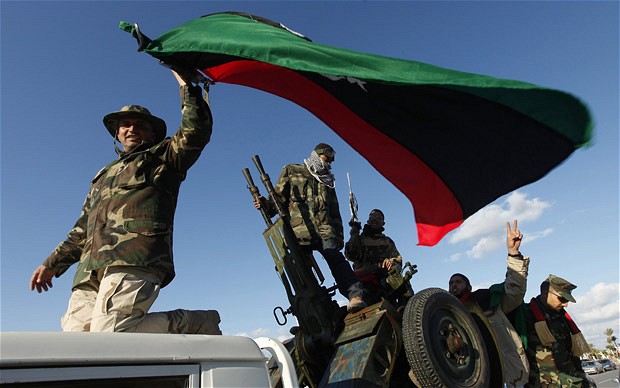 Last Thursday morning Libyan Prime Minister Zeidan was seized by armed militias in Tripoli and freed a few hours later by revolutionary units from the eastern Tripoli suburb of Suq Juma. It is rumoured Thursdays abduction of Al Zeidan is linked to the US special forces raid on Saturday to apprehend al-Qaida suspect Abu Anas al-Libi. The abduction of Zeidan can be seen as one of the signs of fragility of Libya’s state of affairs. The core problem underlying this relates to the basic element of an effective state, namely the monopoly on the legitimate use of force.
Last Thursday morning Libyan Prime Minister Zeidan was seized by armed militias in Tripoli and freed a few hours later by revolutionary units from the eastern Tripoli suburb of Suq Juma. It is rumoured Thursdays abduction of Al Zeidan is linked to the US special forces raid on Saturday to apprehend al-Qaida suspect Abu Anas al-Libi. The abduction of Zeidan can be seen as one of the signs of fragility of Libya’s state of affairs. The core problem underlying this relates to the basic element of an effective state, namely the monopoly on the legitimate use of force.
By Hans Rouw en Daan Kayser
The past months have been plagued by attacks targeting military officers, activists, judges and security agents. Also there is an increasing number of incidents where armed groups put pressure on the government by closing oil pipelines, Tripoli’s water supply or by occupying parliament. The closing of oil installations by militias and political activists has led to a loss of revenue of $130 million a day, giving a blow to Libya’s most vital source of income. At the beginning of October 15 soldiers were shot at a check point near the Khadaffi stronghold Ben-I-Walled. Last Wednesday a naval officer was killed in Benghazi and the Sunday before that three army personnel and policy officer, adding to the over seventy of attacks on military personnel in Benghazi alone. All in all these are worrying signals.
Armed militia groups who fought to topple the Khadaffi regime have refused to give up their weapons and effectively control parts of the country. They are increasingly using force to put the government under pressure to meet their wishes. The government has tried to solve this problem by merging militias into Libyan Shield, a semi-autonomous security force that falls under the Ministry of Defence. This means that these militias (or at least their commanders) are paid by the Ministry, but de facto continue to follow their own agenda. There are unclear lines of command, rivalries between Libya Shield groups, as well as a fluid allegiance to the central government. Besides the regular army and Libyan Shield, the Supreme Security Committee in Libya is the third security organisation that falls under the interior ministry. All in all the state’s security apparatus is highly fragmented and unable to deal with the ongoing security issues.
The weak central government and tensions between political parties in the General National Congress (GNC) are also part of the instability. Over the past three months the two largest blocks in the GNC, the National Forces Alliance, a liberal political block that Prime Minister Zeidan is part of, and the Justice and Construction Party, largely formed by the Muslim Brotherhood, decided separately to suspend their work in national political institutions. Even though these decisions are now partly reversed it shows the fragile situation in the GNC. Last month Mohamed Sawan, the leader of the JCP, called for a no-confidence vote against Prime Minister Zeidan. Tensions between the two parties further escalated with the Prime Ministers visit to the new leadership in Egypt where the Muslim Brotherhood is being persecuted.
The problem of armed militias is further strengthened by the fact that these groups are very well armed, often better than the Libyan army. Their weapons come from the large weapon storage’s Khadaffi built up during his reign. A source from MI6 was quoted as saying ‘there is a million tons of weaponry in Libya – more than the entire arsenal of the British Army – most of it unsecured’. These weapons not only pose a problem for Libya but they are also finding their way to Syria, Egypt and various Islamist groups in the Sahel region.
The intervention in Libya may have helped to topple a dictator, but there is still a lot of work to be done. Libya finds itself at a crucial crossroad and the international community shouldn’t stand by and let Libya descend into chaos.



